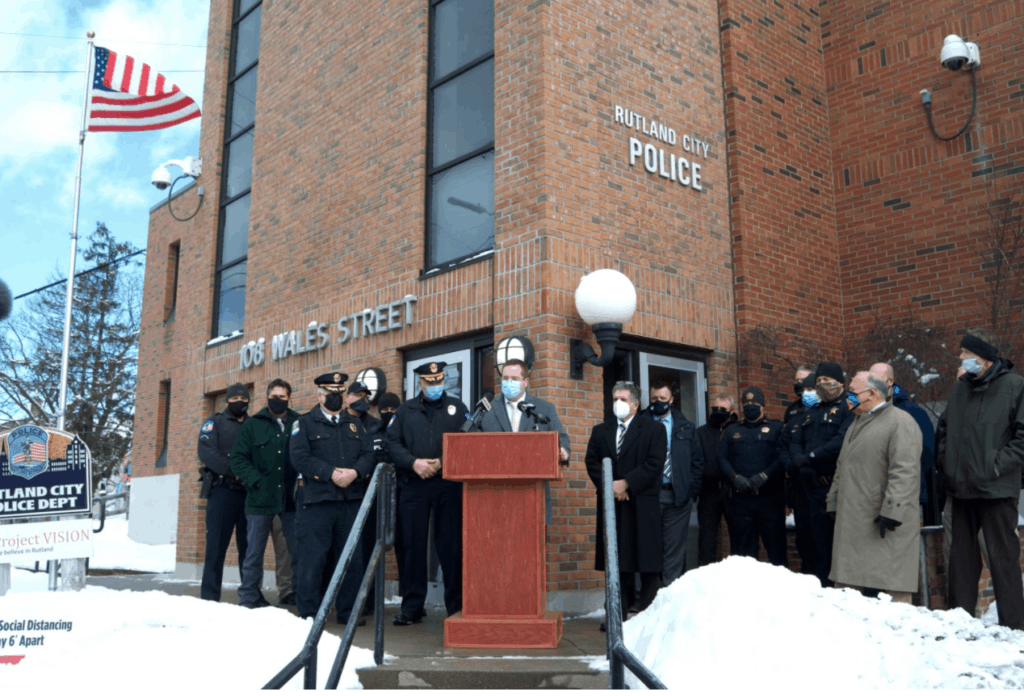
By Emma Cotton and Lola Duffort/VTDigger
Sen. Joshua Terenzini, R-Rutland, introduced a new bill on Thursday, Feb. 11, that would expand police presence in school districts around the state.
Terenzini and Sen. Brian Collamore, R-Rutland, held a press conference in front of the Rutland Police Department offices to announce their sponsorship of S.76, which would allocate $1 million each year for the next four years to the school resource officer program.
Under the legislation, schools and municipalities could apply for $50,000 grants to staff one or more police officers in their district.
The bill directly opposes another piece of proposed legislation, S.63, which would ban the use of school resource officers entirely. Terenzini said he’s received a deluge of calls and emails from concerned parents, teachers and law enforcement officers since S.63 was introduced.
“Most of these calls and emails start off by saying that they just don’t understand why we would want to remove police from our schools,” he said.
Rutland Mayor David Allaire, Police Chief Brian Kilcullen and a number of law enforcement officers from other agencies came to support the new bill on Thursday.
“Educators, parents, law enforcement officers and many politicians stand firm in the belief that this program is a critical piece of safety, security, relationship-building and community policing that cannot be taken from our school systems,” Terenzini said.
Neither legislative proposal is likely to become law as-is. But the dueling bills are yet another example of the renewed scrutiny police are under in the wake of this summer’s racial justice protests. Several Vermont school districts are actively debating whether to end their school resource officer programs and at least two — Montpelier-Roxbury and Champlain Valley Union — have gone ahead and nixed their contracts with police.
School resource officers are a fixture in a slim majority of Vermont school districts and are usually posted in high schools.
Advocates say that money could be better spent on counselors, social workers and other resources that could address misbehavior in more developmentally appropriate ways.
Proponents of school resource officers cite fears about school shootings and say they also help build bridges between law enforcement and the community.
Critics counter that police in schools risk criminalizing run-of-the-mill misbehavior, and note that students of color, students with disabilities and low-income students are disproportionately arrested.
Terenzini attributed those disparities to a select few school resource officers who did not receive proper training, “All students deserve the right to be treated equally,” he said. “Society cannot let a few bad SROs ruin the integrity of this program that is critically important to the safety of our children and educators.”
Advocates have long called for better data collection on discipline and the use of police in schools. But the little data that does exist tends to turn up disturbing disparities — including in Vermont.
Using federal data collected from the 2013-14 school year, an Education Week analysis in 2017 showed that Black students in Vermont accounted for a staggering 23.3% of school-based arrests, despite making up only 2.4% of the enrollment.
That same data set showed that in Vermont, Black students were arrested at 5.4 times the rate of white students during the 2015-16 school year, according to research compiled in S.63, the bill to ban SROs.
Terenzini also referred to this week’s three-year anniversary of an incident in which officials intercepted a former student’s detailed plan for a mass shooting at Fair Haven Union High School. The superintendent of the Slate Valley Unified School District, Brooke Olsen-Farrell, has said she’s against banning school resource officers, WCAX reported.
Terenzini’s bill would prohibit officers with “infractions for excessive use of force or other acts of misconduct” from becoming school resource officers. The bill would also require the officers to participate in at least 40 hours of specialized training, including implicit bias training, de-escalation, trauma-informed investigations, adolescent development and active shooter situations.
If the school resource officer is hired jointly by a school district and a law enforcement agency, the bill would also require a memorandum between the two bodies to agree on the officer’s possession and use of weapons on school property and define the scope of the officer’s role in the school. The bill does not limit or define these factors on its own.
Gov. Phil Scott has said he opposes a statewide ban on SROs. Legislators read S.76 on the Senate floor Thursday before referring the bill to the Education
Committee.




